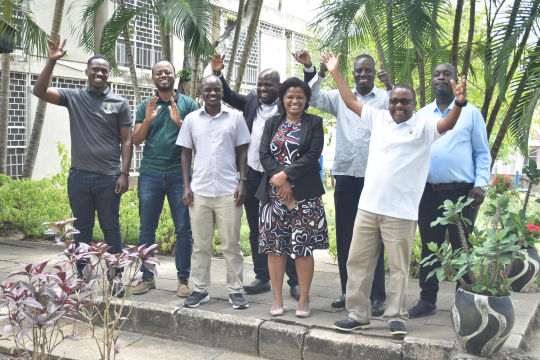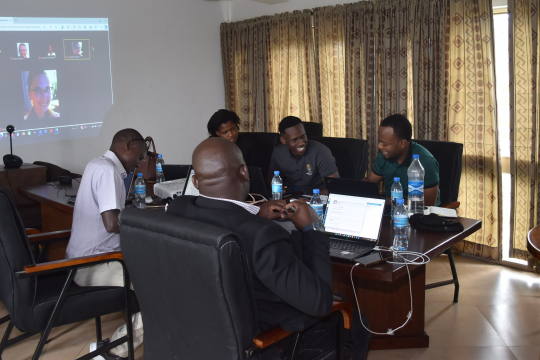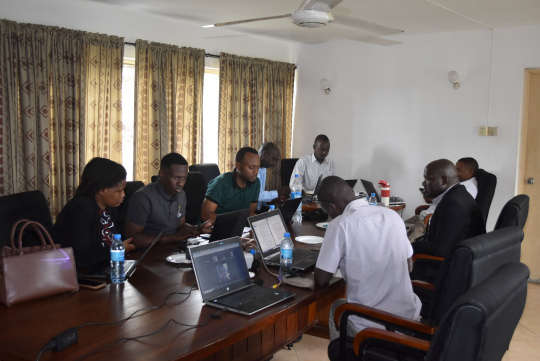A two-day intensive training program on the Inclusive Green Economy (IGE) in Practice was held on September 18-19, 2024, at the University of Dar es Salaam. This training aimed to equip senior civil servants from various Tanzanian ministries with knowledge and practical tools to advance sustainable development through green economy reforms.
The training, led by global experts from Sweden, Uganda, Kenya, Rwanda, and Ethiopia, attracted participants, so-called IGE fellows from key ministries, including the Ministry of Energy, Ministry of Finance, Ministry of Industry and Trade, and Ministry of Transport. The program provided participants with an in-depth understanding of how an Inclusive Green Economy can drive sustainable growth, focusing on environmental sustainability, economic development, and social inclusivity. The opening session featured Dr. Anders Ekbom of the Environment for Development (EfD) Initiative at the University of Gothenburg, Sweden, and Dr. Asaye Ketema of the EfD Ethiopia, Policy Studies Institute. They provided a comprehensive overview of the training and emphasized the importance of transitioning to green economies for sustainable development.
Focus on policies for green energy reforms
Throughout the training, several key topics were covered. Anders Ekbom led a session on the requirements for Inclusive Green Economy reforms and environmental assessments, stressing the need for robust Environmental Impact Assessments (EIA) and Strategic Environmental Assessments (SEA) within policy frameworks. Another significant session, presented by Professor Tomas Kåberger from Chalmers University of Technology in Sweden, focused on Swedish experiences in sustainable energy transitions, with a specific emphasis on the application of economic and policy instruments to foster green energy reforms.
Shared practical experiences
Participants also learned about the experiences from sustainable energy transitions in Uganda through a session facilitated by Professor Edward Bbaale, EfD Uganda at Makerere University, showcasing evidence of Uganda’s efforts to increase energy efficiency and reduce emissions. Dr. Laura Nelima Barasa, EfD Kenya, which is hosted at the University of Nairobi led an insightful discussion on energy efficiency and productivity in female-led businesses, exploring innovations in sustainable energy among female entrepreneurs. The program also featured a presentation on Rwanda's sustainable energy transition by Anatole Uwiragiye from Chalmers University of Technology, who provided insights into Rwanda’s progress in achieving energy efficiency and reducing emissions.
The training concluded with a summary of key messages and implications for the participants’ work in their respective organizations, led by the IGE Training Lead Team, including Emelie César and Asaye Ketema.
Insights in integrating sustainability, growth, and inclusivity
Gilbert G. Uforo, an IGE fellow from the Ministry of Industry and Trade, expressed his appreciation for the knowledge gained during the training.
"The sessions provided a comprehensive understanding of the principles of integrating environmental sustainability, economic growth, and social inclusivity," he remarked.
“Crucial step forward”
He noted that the training effectively addressed key components of IGE reforms, including environmental assessments, policy reform requirements, green technology investments, and promoting social equity through green jobs. Gilbert Uforo also highlighted how examples from other countries offered valuable lessons for Tanzania’s green transition initiatives. He concluded by praising the structure of the program, which allowed participants to revisit course materials and recordings. He also suggested future improvements, such as post-training discussion forums and follow-up sessions or webinars to deepen understanding and cover any unanswered questions.
Kelvin Tarimo, an IGE fellow from the Rural Energy Agency (REA), echoed these sentiments. He stated that the training gave him critical insights into the legal and policy instruments required for IGE reforms. "The training shed light on Tanzania’s transformative experiences and challenges in pursuing a sustainable energy transition," Kelvin Tarimo noted.
Both participants agreed that the training was a crucial step toward fostering an inclusive and sustainable green economy in Tanzania, equipping them with the tools to influence positive changes in their respective fields.
Other participants in the training session were Ms. Ruth Chuwa from the Ministry of Transport, Hassan Said Mwakioja from the Ministry of Finance, and Mgune Masatu Mgune from the Ministry of Energy. The local support team was led by Aloyce Hepelwa IGE lead, Gerald Kibira, Senior researcher, and Wilhelm Ngasamiaku, Policy Engagement Specialist.
Learn more about the IGE program!
By Salvatory


